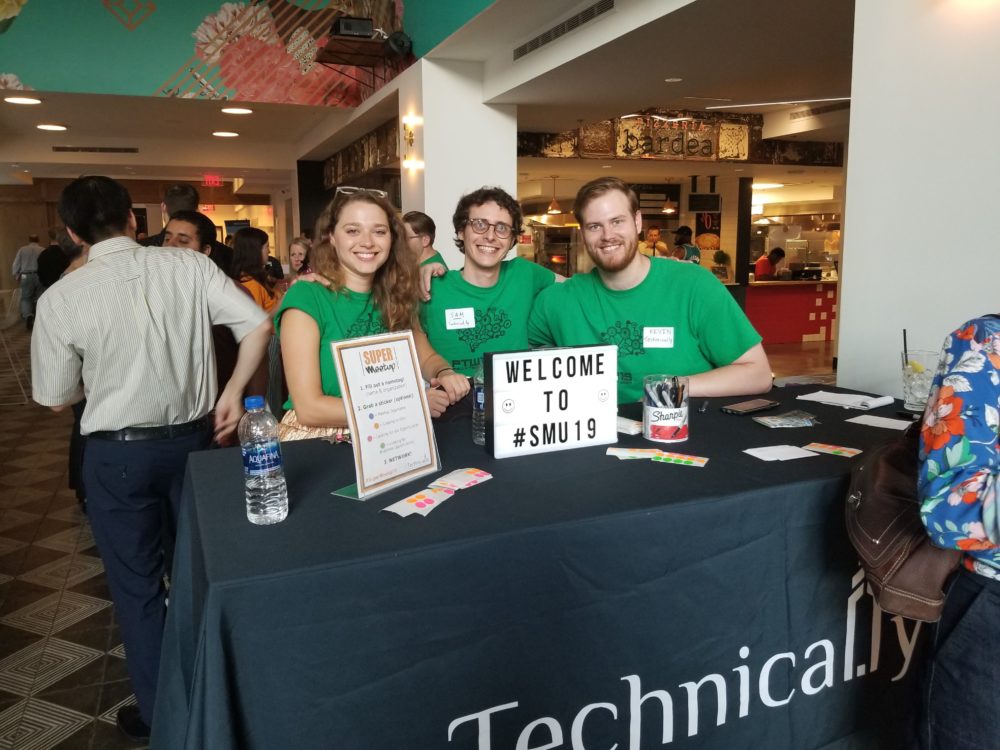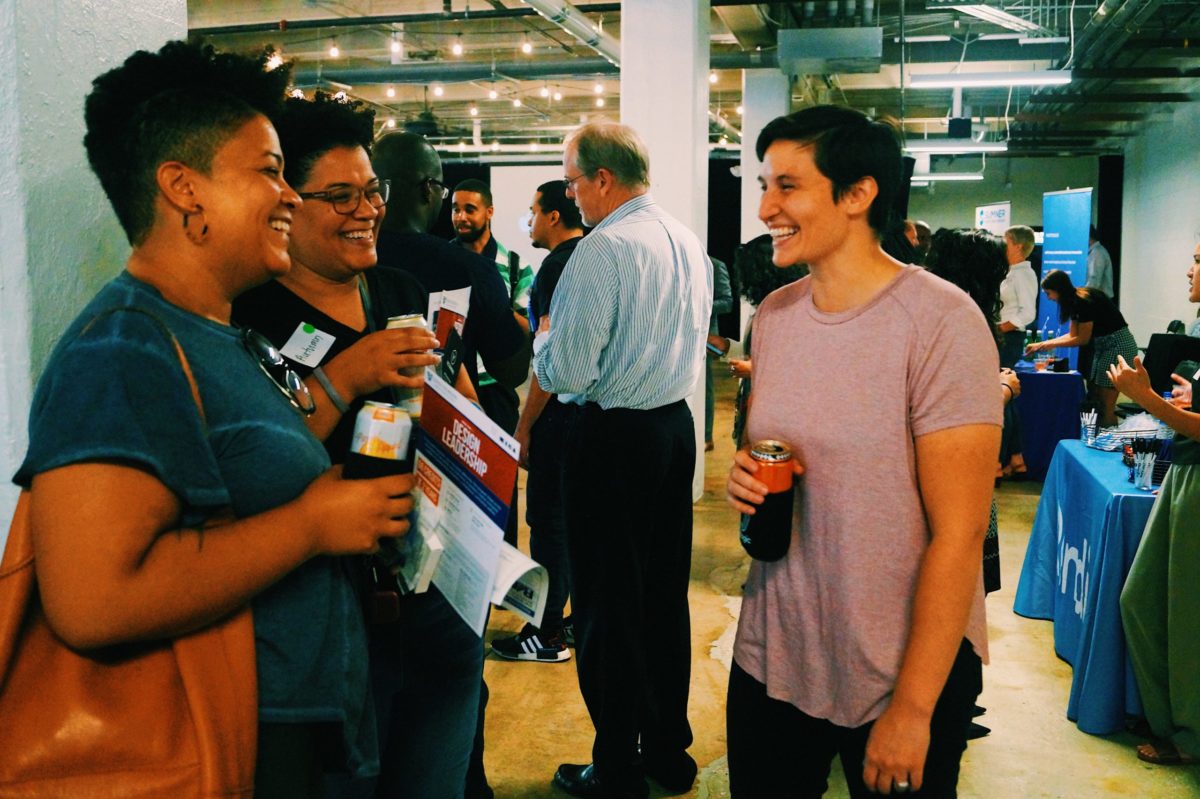Even for technologists used to working in front of a screen all day, the switch to all-virtual everything has been decidedly challenging — including when it comes to affinity groups that typically network and learn together in person.
Ahead of Thursday’s virtual Super Meetup, Technical.ly asked two dozen meetup organizers from Philly, Baltimore, D.C. and Delaware how their groups have navigated the past few months. In a survey, around 80% said they’d hosted virtual events, while around a quarter reported they’d been on a hiatus. Yes, there’s some overlap there — perhaps implying a virtual event had been tried and unsuccessful, or that such events have happened so rarely that the group is basically inactive. None said they’d hosted an in-person event.
Meanwhile, around half said COVID-19 hadn’t impact their groups much, while 30% said the impact had been negative, and only a few said “mostly positively.”
We wanted to dig deeper: What lessons were organizers pulling from their first-ever virtual meetups? Were there unforeseen benefits to going virtual? Are some still figuring it out? Via email, here’s what 13 organizers said; some responses have been lightly edited for length or clarity:
Lack of geographic restrictions = net benefit
Philly ROS hosted our first virtual meetup in July. I expect we will do more of that in the coming months. A surprising side effect of this was that we attracted (and were open to) attendees from around the world. We were also able to “bring in” high-profile speakers in our industry. In our case, one was based in the Netherlands while the other was on the West Coast of the U.S. Without being forced to do a virtual meetup, we would have likely not tapped into this larger “talent pool.” While we have no intention on diluting the “Philly” from Philly ROS, it is an opportunity to rethink the meetup without geographic constraints in terms of speakers and attendees.
— Organizer Tom Panzarella
With COVID, GDG Philadelphia pivoted, like most groups, to virtual-only events. Fewer people have attended those compared to our usual in-person events, which is understandable since Zoom meetings don’t have the same draw as an in-person event. We tried to keep the format the same as our in-person events (some socializing and then PowerPoint-driven technical sessions). Those have generally been OK but we have gotten some feedback for longer social sessions.
We are also connecting with other Google groups and sharing events (like GDG NY and Google Cloud Philly) since it’s as easy to attend an event organized by GDG NY as it by GDG Philadelphia. Other events are also planned like co-viewing events organized in concert with Google itself.
— Organizer Arpit Mathur
A long-awaited experiment
The Open Web Application Security Project (OWASP) chapter of Delaware has been wanting to add a remote attendance option to our meetings for some time. Besides the technical challenges of adding remote attendance to a physical meetup there was the philosophical dilemma of potentially cannibalizing our own physical attendance. We attempted adding remote attendance to our meetings pre-pandemic but encountered low usage and technical issues.
Then the pandemic hit and shut down our venue of choice. This happened just as our group was coming out of winter hibernation. However, since March 2020 our chapter has met monthly online, with a good run of speakers to boot. These have been some of our best meetings. It will be great to get back into physical meetings, but we will keep the remote attendance option moving forward.
— Chapter Lead David Rhoades
Responding to the moment
At Vinetta Project DC, we jumped right into the virtual pool and immediately started executing programming to help entrepreneurs traverse PPP and the uncertainty of Q2 2020. Since then, we’ve put on three stellar pitch competitions, an informative seminar with the National Women’s Business Council and Small Business Association, 10 wine night networking events, and a number of other info sessions.
Amidst the George Floyd and BLM protests, we also took a step back to see how we could use our platform to directly impact the Black entrepreneurship community. Since then, we have partnered with Bowie State University to help HBCU students plug into the region’s resources. These past few months have been a whirlwind, but we are proud of the initiative and focus our team has demonstrated in support of women founders facing unprecedented times.
— Director Dawn Myers
Code for Philly made the shift to virtual meetups quite quickly. The shutdown began just as our Opioid Data Hackathon was ending, forcing the teams’ final presentations to be a virtual event. While we miss seeing everyone in person, meetups have continued over the past few months, including a very productive hackathon event for PHLASK using Pragli, and our Slack project channels are still very active. Recent events and protests for racial justice have also spurred interest in our partnership with Philadelphia Bail Fund and Philadelphia Lawyers for Social Equity. We’re excited to announce a new initiative to increase access to paid work experiences in tech for underrepresented groups.
— Communications Lead Julia Schuchard

Maintaining (something like) normalcy
At ProductTank Philly, we have been very deliberate about keeping up our usual monthly cadence for events, but doing so in a virtual format. My thinking is, with all the other chaos going on for our members, if we can offer a bit of stability and continue to bring our community together to talk through the challenges they are facing, it might just help everyone cope.
One thing I have learned in these past few months is that, while it’s relatively easy to continue to find good speakers and produce informative events, the one aspect of in-person meetups that has suffered the most is the face-to-face conversations. Sure Zoom has breakout rooms, but we’re finding that it’s simply not the same dynamic. So I have started to do some deep thinking, and experimenting, around how we can recapture this in a virtual format. Last month we had an event dedicated solely to networking; no speaker, just breakout rooms and conversation starters. It went really well! For our next meetup, we are brainstorming ways we can do even better at fostering those spontaneous discussions in a more natural way.
— Organizer Pete Fleming
When the quarantine was enforced, Zip Code Wilmington was midway through a session with our 14th Java cohort and two weeks into our first Data cohort. We were able to pivot and continue the classes and assignments online. We still have our weekly professional development workshops and Meet the Experts talks with the cohorts, they’re just now through Zoom. The students (who are now alumni) have been able to interview for are companies through Zoom as well.
We’ve tried to keep it as close as possible to our standard curriculum. They still do group coding projects but they’re just in breakout sessions on Zoom. We’ve built an online portal that houses all assignments, labs, projects and assessments that the students have access to.
— Marketing Manager Janelle Bowman
Rest mode
GeoPhilly has been largely inactive during this time but has been happy to point our members to other virtual opportunities, like student capstone talks and Super Meetup for example. We’ve had a couple people reach out about wanting to do something virtual with us but nothing has gotten off the ground yet. My fellow organizers and I don’t have access to Zoom accounts and two of us actually work in emergency management which as you can imagine has been keeping us very busy!
— Organizer Amory Hillengas
Pause, then transparency
Delaware Tech Meetup took a hiatus initially while we figured out the pandemic, but for the past three months, we have been 100% virtual via Zoom. Specific to our group, I think it helped that we were transparent about the lack of information and stating that we would be taking a “wait-and-watch” approach due to the lockdown and restrictions on group gatherings. So in March and April, I sent out emails every three to four weeks to the group reiterating this and sending useful links about the CDC guidelines and stimulus programs.
That said, the group and speakers have also been very supportive and adapted beautifully to the new format (being tech enthusiasts worked in our favor!). For our DevOps session, I did a pre-check for the Zoom session with the speaker, to smooth out any technical issues with screen-sharing. Beyond that, the audience participated as actively on Zoom as they did at our live events.
— Organizer Ann Venkataraman
Still figuring it out
I know for us over at IGDA Baltimore dealing with the pandemic has been a bit of a struggle. However, IGDA HQ was kind enough to lend us their Discord and Twitch channel, which facilitated us hosting our first remote meeting over a month ago. We’re in the process of planning more remote speaker events, and some other types of remote content. I think this is a process we’re going to have to tune, but my hope is that we’ll come out of this stronger, with a better grasp on how to give our members digital content in the case that they can’t make in-person meetings once the pandemic is over.
— Chair Jonathan Moriarty
Code for DC has shifted to a virtual format for our project nights. There were some kinks to iron out the first couple times, but we’ve now gotten into the hang of things. Our attendance is probably about half of what it was for in-person events. Now that we’ve gotten the logistics running smoothly, we’re thinking more broadly about how we can improve the structure and format of our events.
— Organizer Greg Jordan-Detamore
Giving hybrid a try
BaltoMSDN had our first virtual meeting in April and we had another in May. Both were very well attended and I was surprised how much the group enjoyed gathering even if it was just virtually. The meeting even ran long as folks just kept chatting long after the presentation was complete. We generally go on hiatus during the summer and resume in the fall. I expect our first meeting might be a hybrid meeting with some people being the meeting space (probably a large private room at a restaurant where we can observe social distancing) and some joining by Zoom. I’m very curious to see if we can pull this off technically.
— President Ed Mullin
Staying virtual
In terms of membership, Ionic Philly has grown by about 25% (adding 100 new members from the ionic community) and we are continuing to grow it daily. We’re actually planning to keep our meetup virtual, as it seems to be a great way to engage with a broader audience and make the content that’s being provided more accessible to folks across the world. It’s also much easier to record events, and we’ve been able to post more content on our YouTube channel because of it.
— Organizer Jedidiah Weller







